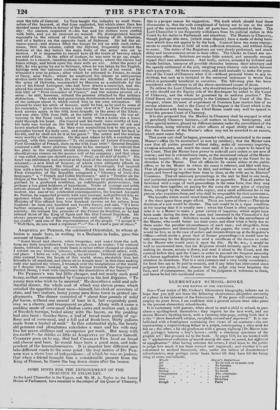this is a proper season for suggestion. The truth which
should lead these discussions is, that the evils complained of belong not to 'one or the other part of the system merely, but that all parts have contributed to them. The Lord Chancellor is too frequently withdrawn from his judicial duties in this Court by his duties in Parliament and elsewhere. The Masters iii Chancery, though perhaps able men, (which some dispute) have a mode of doing busi- ness which does not appear to be the best. Counsel have too many engage- ments to enable them to fulfil all with sufficient attention, and without delay to some. The duties of the Registrars are very slowly performed, and much delay and inconvenience arises in their office. The Clerks in Court are un- necessary officers. Sulicitors are under little control, and naturally enough regard their own emoluments. And lastly, suitors, actuated by irritated and hostile feelings, interpose all possible obstacles between their adversary and the speedy settlement of the suit, adopting every dilatory rule which favours such a purpose. All these causes reign, and tend mutually to make the prac- tice of the Court of Chancery what it is—without personal blame to any in- dividual, but such as is included in the universal endeavour tc retain that which is personally beneficial to ourselves. The following plan has been considered with reference to all the above-mentioned causes of abuse.
To relieve the Lord Chancellor, why should not anotherjudge be appointed ; or why should not the Equity side of the Exchequer be added to the Court of Chancery, and the whole be governed by an uniform practice ? The Chief Baron sits very unnecessarily in the Common Law Court of the Ex- chequer, where his want of experience of Common Law renders him of no service whatever. And as the Court of Exchequer is the Court which is the least burdened with business, the Chief Baron could very well be spared to assist the present Court of Chancery.
It is also proposed-that the Masters in Chancery shall be engaged in what is peculiarly Chancery business,—all matters in lunacy, bankruptcy, and other special matters, placed by differentstatutes under the surveillance of the Chancellor, being intrusted to other officers of equal ability and rank ; so that the business of the Master's office may not be crowded to an excess, which must cause delay.
That every suit shall be begun, proceeded with, and terminated in the same Master's office (to he ascertained as now by rotation); that the Master take care that all parties proceed without delay, make all necessary inquiries, examine witnesses, and watch the cause until it be in a state to be heard by the Court. That the Master have power to make all such orders as are now of course ; and that in extraordinary cases, or the occasional refusal of the Master to make inquiries, &c. the parties be at liberty to apply to the Court for its direction to the Master. That all affidavits be sworn either at the public office, or by the Master to whom the cause is referred, and filed with him. That all proceedings in a cause be filed, and written on an uniform kind of paper, and bound up together from time to time, as the wills are in Doctors' Commons. 'f hat all necessary proceedings in the suit be filed in one book, and incidental proceedings in another book or appendix. That all parties be furnished with a copy of such proceedings in the same form, that they may also bind them together, on paying for the same the mere price of copying them, charged by the stationer who copies, and a small additional fee to the person who examines them, and who shall be responsible for their correctness.
The benefits which would result from this plan, perfected, cannot be shown n the short space these pages afford. These are some of them :—Thevehole duration of a suit would be shorter. The suit would be in a riper condition at the hearing than it is usually now ; when the Court is often compelled to refer it to a Master to make a great variety of inquiries, which might have been made during the time the cause had remained in the Chancellor's list of causes to be heard. Solicitors would be controlled by the surveillance of the Master, who could better tax their costs, and allow what is fairly due to them under the peculiar circumstances of each case ; and altogether, from the compactness and diminished length of the papers, the costs of a cause would be less, as in the case of orders and decrees drawn up at the Registrar's Office—which recite a great deal of former proceedings—it would now be only necessary for the Registrar to send a certificate of the decree or order to the Master who would enter it upon the file. By the way, it would be well to recommend here, that the Registrar should instantly upon the Court making its decree, minute it down, and read it aloud to the Court, and the counsel before they quit the Court, in order to prevent the frequent necessity of a future application to the Court to put the Registrar right, who may have mistaken its directions. This is a very common and a very costly occurrence; for fresh fees are to be paid to counsel, and if any delay has intervened since judgment was given, it may chance that the judge may have forgotten the facts, and of consequence, the justice of his judgment in reference to them, and hence be led into accidental error.


















 Previous page
Previous page